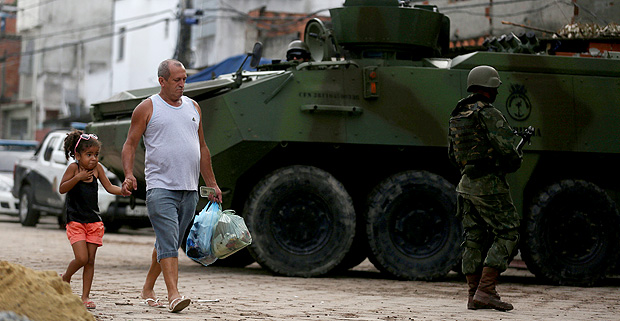Latest Photo Galleries
Brazilian Markets
17h34 Bovespa |
-0,32% | 124.741 |
16h43 Gold |
0,00% | 117 |
17h00 Dollar |
+0,38% | 5,1487 |
16h30 Euro |
+0,49% | 2,65250 |
ADVERTISING
Entrepreneurs Show Support For Military Presence in Rio
03/05/2018 - 09h57
Advertising
THAIS BILENKY
FROM SÃO PAULO
News of the military's increasing control over command posts was welcomed by members of the country's economic elite.
"We are in a situation of war. That means we need to root for the best outcome", said the owner of Riachuelo, Flavio Rocha, who is trying to launch his own presidential campaign.
The Brazil 200 Movement, which is led by Mr. Rocha and has among its ranks entrepreneurs such as Alberto Saraiva (Habib's), João Apolinário (Polishop), Ronaldo Pereira Junior (Opticas Carol) and Pedro Thompson (Estácio), will be releasing a security proposal calling on harsher measures for combating violence.
Businesswoman Rosy Verdi (Rodobens) said that "democracy is important", but she also praised Thailand's authoritarian regime.
"It's a country that has the same things we have here, wonderful beaches, but much more poverty, and you don't see that side of things, you just see the beautiful things."
A Datafolha survey conducted in June of 2017 revealed that the Armed Forces are esteemed as the country's most reliable institution, a view that is particularly prevalent among wealthier segments of Brazilian society.
Among families earning up to twice the minimum wage, 38% said they considered the Armed Forces very trustworthy, while 16% said they did not find them reliable.
Among families with a monthly income of ten times the minimum wage, 47% deemed the Armed Forces very trustworthy while 10% said they did not find them reliable.
"Support among the poorest is lower because, not only do they live in fear of criminals, they also face a lack of security that surrounds police activities", said Datafolha director Mauro Paulino.
According to historian Carlos Fico, only the more intellectual sectors of the country view the Armed Forces, which imposed a military dictatorship from 1964 to 1985, with skepticism.
The view held by society as a whole is, for the most part, a receptive one. The economic elite, on the other hand, is especially "pragmatic when it comes to favoring its own interests".
Translated by THOMAS MATHEWSON
Read the article in the original language
| Pilar Olivares/Reuters | ||
 |
||
| Members of the armed forces patrol the Kelson's slum during an operation against crime in Rio de Janeiro |



